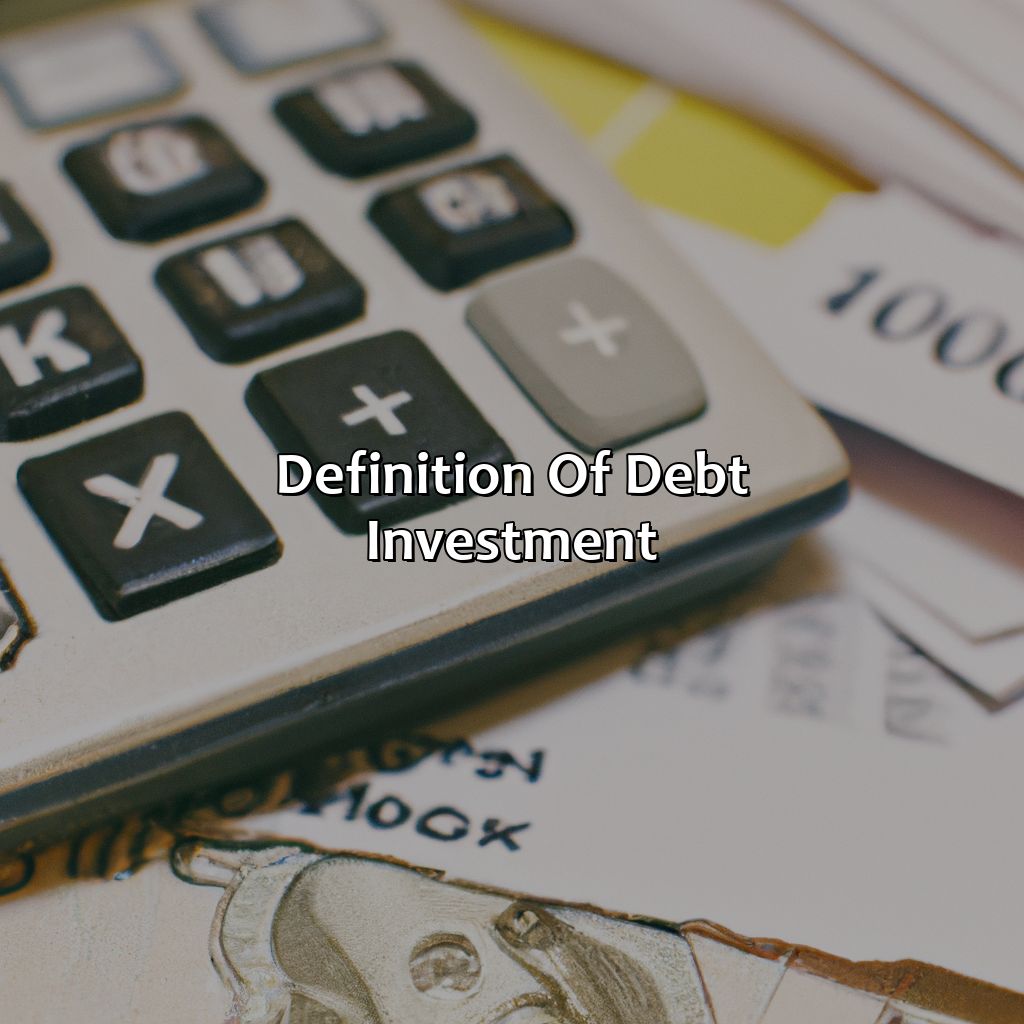What Is Debt Investment?
Key Takeaway:
- Debt investment refers to the act of investing in debt instruments such as government bonds, corporate bonds, and municipal bonds.
- The different types of debt investment carry varying levels of risk and reward, with government bonds being the safest, but also offering lower returns compared to corporate and municipal bonds.
- Debt investment provides regular income, safety of investment and diversification of portfolio, making it a suitable choice for conservative investors seeking a steady stream of income while keeping risk at a minimum.
Are you curious to learn more about debt investment? This article explains the basics of debt investments, the unique opportunities it provides and how it could be a beneficial long-term choice for you. Get the answers you need to make the best decision for your financial future.
Definition of Debt Investment
Debt investment refers to the act of investing in fixed income securities, such as bonds, where an investor loans money to an entity, typically a corporation or government, in exchange for regular interest payments and the return of the principal at the end of the loan term. This type of investment is generally considered to be less risky than equity investments, as the borrower is obligated to repay the debt, even if the company’s profits decline.
In addition to bonds, debt investments can also include other fixed income products, such as money market funds, certificate of deposits (CDs), and Treasury bills. These investments typically offer lower returns than stocks, but also carry less risk.
One unique feature of debt investments is the ability to purchase them at a discount to their face value, creating opportunities for capital appreciation. However, it’s important to carefully consider the creditworthiness of the borrower before investing, as the risk of default can lead to significant losses.
Pro Tip: Diversifying your debt investments across a variety of issuers and sectors can help mitigate credit risk.

Image credits: retiregenz.com by James Washington
Types of Debt Investment
In the domain of finance, there are various forms of investment, and one such type is investing in debt. This type of investment entails lending money to a borrower who is obliged to repay the money along with interest. Several forms of debt investment exist, including fixed income securities, bonds, money market instruments, collateralized debt obligations, and asset-based lending.
- Fixed Income Securities: An instrument that provides a fixed return, such as a Certificate of Deposit(CD), Treasury Bonds or Corporate Bonds
- Bonds: Debt securities that pay interest periodically and return the remaining principal upon maturity
- Money Market Instruments: Short-term debt securities that mature within a year, such as commercial paper or Treasury Bills
- Collateralized Debt Obligations: Securities composed of a pool of debt, such as mortgages or car loans, with varying risk levels
- Asset-Based Lending: Providing loans backed by collateral, such as inventory or account receivables
It is noteworthy that investors receive returns through interest payments rather than equity ownership in the company, and the risk level varies depending on the investment type. Investing in debt may be beneficial for investors who seek a lower level of risk or need a consistent stream of revenue from their investments. According to Forbes, 60% of the global bond market has returns of less than 1%.

Image credits: retiregenz.com by David Arnold
Advantages of Debt Investment
Debt investments provide numerous benefits to investors and are an excellent way to generate regular income. The following points highlight the advantages of investing in debt securities:
- Lower risk: Debt investments are relatively low-risk compared to equities, making them an attractive option for investors who want to minimize their exposure to market risks.
- Steady flow of income: One of the most significant advantages of debt investments is the steady flow of income they offer. Debt instruments like bonds and debentures typically pay regular interest or coupon payments, which can serve as a reliable source of income for investors.
- Predictable returns: Debt investments are ideal for investors looking for predictable returns. Since the interest rate and tenure of debt instruments are usually fixed, investors can accurately calculate the returns they will receive before investing in them.
- Diversification: Debt investments can help diversify an investor’s portfolio. By adding debt instruments to their portfolio, investors can spread their risk across different asset classes, reducing the overall risk profile of their portfolio.
Notably, debt investments have some unique features not covered in the previous points. Debt securities are often easier to trade and more liquid than other types of investments, making them a preferred choice for short-term investors.
A classic example of debt securities and their advantages was seen in the early 1920s when investors flocked to buy US government bonds in the aftermath of World War I. The bond’s predictable returns and relatively low risk profile made it a popular choice for investors, and the market for US government bonds grew rapidly during that period. Today, debt investments continue to represent an essential component of a robust investment portfolio, providing investors with a reliable source of income and stability in uncertain economic environments.

Image credits: retiregenz.com by Harry Jones
Five Facts About Debt Investment:
- ✅ Debt investment involves lending money to an entity, typically a company or government, with the expectation of receiving regular interest payments and repayment of the principal. (Source: The Balance)
- ✅ Debt investment is considered less risky than equity investment, as the borrower is contractually obligated to repay the debt with interest, whereas equity investors are not guaranteed a return. (Source: Investopedia)
- ✅ Bonds are a common form of debt investment, and a bondholder is essentially a lender to the issuer of the bond. (Source: Forbes)
- ✅ Debt investments can be traded on secondary markets, providing investors with liquidity and the ability to buy and sell their positions. (Source: The Balance)
- ✅ Different types of debt investments include corporate bonds, municipal bonds, Treasury bonds, and certificates of deposit (CDs). (Source: NerdWallet)
FAQs about What Is Debt Investment?
What is debt investment?
Debt investment is the act of investing money in fixed-income securities such as bonds and debentures. These investments provide a fixed rate of return and are generally considered to be a relatively safe investment option.
What are the benefits of investing in debt?
Investing in debt can provide a steady stream of income through interest payments. It is a relatively safe investment option compared to the stock market. Additionally, investing in debt can help diversify an investment portfolio and reduce overall risk.
What are the risks associated with debt investment?
Although debt investments are considered low-risk, there are still risks involved. The biggest risk is default or the failure of the issuer to pay back the principal and interest. Interest rate risk is another risk as interest rates can rise or fall which can affect the returns of these investments.
What types of debt investments are available?
There are numerous types of debt investments available including bonds, corporate debt, government bonds, municipal bonds, and debentures. Each of these has its own risk profile, return potential, and investment term.
How can one start investing in debt?
To invest in debt, one can buy individual bonds or invest through mutual funds or exchange-traded funds (ETFs). It is important to do research on the investment options and understand the risks involved before investing.
What is the maximum return on investment in debt?
The maximum return on investment in debt will vary depending on the type of investment, level of risk, and other factors such as the current interest rate environment. While there is no specific maximum return, debt investments generally offer a lower return compared to high-risk investments such as stocks.
